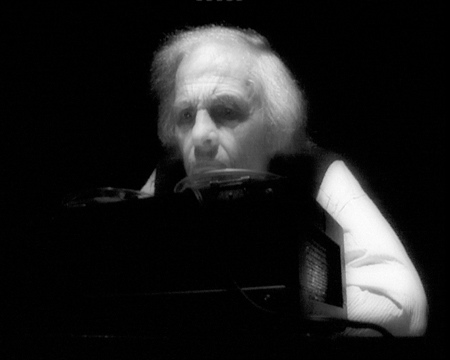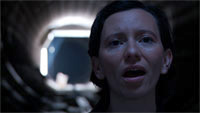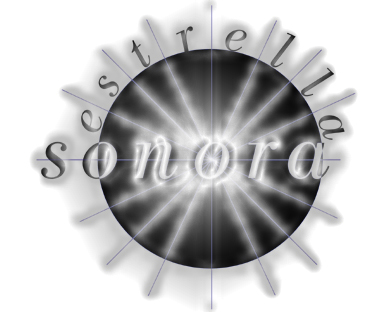Krapp's Last Tape | Kosher | Devotions | Something Old | Stormwater | Dogs | Kantor in the Prado Museum | Pronomos Music
Projects | HOME | Tom Skipp | Contact
English | Spanish
TOM SKIPP – FILM WORKS – KRAPP'S LAST TAPE

42 mins. approx.Black and white.
English language (with Spanish subtitles).
Filmed and edited in Spain at Nada Films International in Madrid, Spain, 1999-2000.
Produced by Mask Films.
CAST AND CREW
Peter Shreve in the part of Krapp.
Photography by Yann Malka.
Directed by Tom Skipp.
RIGHTS
Tom Skipp was given permission to make the film in writing by Jerôme Lindon, Samuel Beckett's literary executor.
This approval was ratified by the Samuel Beckett Estate in 2006.
IMDB
http://www.imdb.com/title/tt1424354/maindetails
For screenings
Please fill out this online form
SCREENINGS
The film was premiered and screened every day at the "Beckett" exhibition at the Centre Pompidou (Paris, France).
THE ACTIONJust one character appears in the film, Krapp, a sixty-nine year old man, surrounded by darkness in his room. Krapp sets up an old reel-to-reel tape recorder under the light above his desk in readiness for a listening session. He looks through a ledger of recordings he has made of himself over the years in the manner of a personal diary or confession, and chooses one to listen to. He presses play and the room is filled with the voice of a much younger Krapp at the peak of his life. The older man relives the experiences of his past and the decisions and circumstances that have led to his current state. Finally he turns the tape off, fetches a microphone and feeds a blank spool onto the deck and begins to record his last thoughts. When he has finished he puts one of the earlier spools back onto the deck and listens once more to his younger self, to a fleeting moment of happiness, as he stares ahead the tape runs to an end and the darkness engulfs him.
PHOTO GALLERY






ABOUT THE FILM
Rehearsals began in July 1999 for the audio tape of young Krapp, which was recorded direct to DAT at Monica's Studio in Madrid, before shooting began. Costume was found. The special noisy slippers that Beckett liked so much were the actor Peter Shreve's own slippers. Filming took place at the studios of Nada Films International, in Madrid in August 1999 on broadcast quality Digital Video. Many of the shots of Krapp "listening" used a computer programmed motion control crane. For greater realism, the tape of young Krapp was actually relayed through the speaker of the on-set tape recorder and sound was recorded direct. The film is lit with just one French-made cinema spot, circa 1950, which creates a very special quality of light. Occasionally an additional tiny spot was used to enhance the lighting of certain objects, for example, the speaker grille on of the tape recorder. The film was edited and post-produced at Nada Films where a special black and white texture was applied to it. The final format is Betacam Digital. A DVD is also available.
TRAILER
Press "play" to watch the trailer
ABOUT THE TEXT
Beckett's written instructions, provided for the Westdeutsche Rundfunk TV production, served as inspiration and guidance for the film. In these instructions the author recommended using two cameras. In Beckett's own words, one camera is a "mere eye" for general shots, and the other is a moving eye which investigates "detail of table situation, hands, face, machine, ledger, boxes and tapes. This camera listens and its activity is affected by words spoken. It can be used not only as a 'savage eye', but as a means to distinguish in this recorded past those moments which matter little or nothing to Krapp from those which matter much or extremely". Some of Beckett's notes, included in "The Theatrical Notebooks" also helped the general concept of the film. The language of the film is English.
DIRECTOR'S NOTE
In this film version I tried to bring out the Manichaean themes underlying the play. Black and white was the obvious choice for the film as it highlighted the essence of that subtext with its contrast between black and white, darkness and light. Krapp only exists when he is in the light, when moves away into darkness he simply disappears, swallowed by the blackness. Throughout the film, as he listens to the tape of his voice, the camera -imitating the movement of the tape reels- moves almost imperceptibly at first from Krapp's right side, bathed in light, to his left side, consumed by shadow. This listening process is a lengthy one as Krapp frequently rewinds the tape (and consequently the camera position) but eventually this movement leaves Krapp completely in darkness. This listening process is broken when Krapp begins actively to record his thoughts to tape. In this spoken monologue I tried to reflect the tension of this moment of desperation, as well as the change from passive listening to active speaking and recording, by means of a rapidly changing collage of close-ups of Krapp's face and the objects he uses. A treatment reflecting the "savage eye" that Beckett alluded to when considering filming this piece himself.
SHORT BIOGRAPHIES
(Director) Tom Skipp, England, went to the Arts Educational School in the Barbican, London, and continued his theatre studies at Brooklands College, Weybridge. He graduated in Theatre Studies at the University of Warwick. He toured Europe as a performer and director of plays by Shakespeare, Wedekind, Barnes, etc. Since 1990 he has lived and worked in Spain. In 1996, he organised an exhibition about the Polish theatre director Tadeusz Kantor in Madrid (Fundación Telefonica) and Barcelona (Fundación Caixa de Catalunya). In 2005, he co-curated the Real Spanish Art exhibition at the Nagasaki Prefectural Museum of Art.
(Director of Photography) Yann Malka, Spain, attended the Lyceé Français in Madrid. A trained pianist, he studied composition in Paris. In 1994, he began to work as a director and editor of TV commercials at Nada Films International.
(Krapp) Peter Shreve, Scotland, painter. He grew up in Germany the only son of a German mother and a Scottish father. During the Nazi regime he was sent to a detention camp because of his mixed nationality. He has travelled extensively and has worked in a variety of jobs from a medical orderly to the manager of a racetrack in South Africa. He currently lives and paints in Madrid, supported by a small grant from a Swiss Foundation.
Request Press Kit (Please state the name of the media you work for)





Krapp's Last Tape | Devotions | Something Old | Stormwater | Dogs | Projects | News | Tom Skipp | Screenings | Contact
English | Spanish
email: estrellasonora@gmail.com
© 2002 – 2019 Estrella Sonora. © Web Design: Tom Skipp

